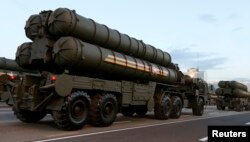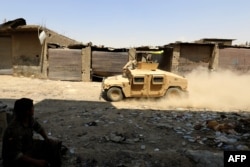Top diplomats from Turkey and the United States are working hard to bridge the deep gulf between the two NATO allies.
U.S. Assistant Secretary of State Tina Kaidanow is in Ankara for talks this week, while Turkey's top diplomat, Umit Yalcin, will visit Washington this weekend.
However, the effort may be complicated, as Ankara improves ties with neighboring Iran while America prepares a tougher approach to that nation.
Turkish analysts say U.S. President Donald Trump's nomination of CIA chief Mike Pompeo as secretary of state and John Bolton's appointment as national security adviser show that the administration is taking a hard-line view toward Iran.
Aydin Selcen, a former senior Turkish diplomat who served in Washington and Iraq, said Pompeo is already focused on Iran, and he noted that disagreements with Trump over Iran policy were a key reason Rex Tillerson was fired as secretary of state. Selcen said a hawkish new policy might force Ankara to choose between Iran and the United States.
Washington has been wondering about Turkey's commitment to Western allies since Ankara bought the powerful, long-range Russian S-400 surface-to-air missile system. The deal prompted calls in Congress for Turkish sanctions.
Fresh start
But a more confrontational approach by Washington toward Tehran offers the opportunity of a reset in Turkish-U.S. ties.
"I think the United States does not want to punish Turkey. I think the American establishment would love to befriend Turkey," said analyst Atilla Yesilada of GlobalSource Partners, a markets research and analysis firm. "But they need someone on the ground as insurance against Iranian expansion, and Turkey is simply not ready to assume that role. Until Ankara changes its view and decides to adopt a more robust or antagonistic approach to Tehran, Americans cannot consider Turkey a strategic ally, and I don't know if that change will come."
Observers point out that with Turkey bordering Iran and being a key Iranian trading partner, Ankara would be an important if not vital ally for Washington as it confronted Tehran.
Iran and Turkey have always competed for power and influence in the region but have tempered such competition with cooperation. Syria has become a focal point of this balancing act. Turkey's expanding military operation into Syria against a Kurdish militia is reportedly causing growing unease in Tehran. At the same time, the two countries are cooperating with Moscow to try to resolve the civil war, in what has been dubbed the Astana process.
"Ankara is not on the best of terms [with Iran] at the moment," said political columnist Semih Idiz of the Al Monitor website, "but they are trying to maintain this appearance of cohabitation within this Astana process relating to Syria. Turkey would want to tread very cautiously, in terms of whether to align itself with America against Iran."
Some Turkish analysts have suggested that Ankara's price for backing Washington against Tehran could be an end to U.S. support of the Syrian Kurdish militia, the YPG, in its war against Islamic State.
Ankara accuses the militia of being linked to the PKK, which has waged a decades-long insurgency inside Turkey. With the YPG controlling a large part of Syria, it is also widely seen as important to Washington's efforts to curtail Tehran's influence in Syria.
Tehran offers
But Tehran has also been courting Ankara with offers of expanding bilateral trade. The two countries also recently found common ground in opposing Iraqi Kurdish aspirations for independence.
Such cooperation also has raised hopes in Ankara of getting help against the PKK, which has its headquarters in the mountainous Iraqi Qandil region that borders Iran.
"Ankara thinks by befriending Iran, they can get PKK out of Qandil," Yesilada said. "Of course, there is the economic angle. Russia does the same thing to Turkey. They [Iran] dangle these massive economic projects or trade benefits, and Ankara gets fooled by those projects, even though Tehran hasn't done us any favors recently."
Ankara has in the past insisted it's bound to enforce only U.N. sanctions against Iran, not Western allies' measures against Iran.
Next month, Mehmet Hakan Atilla, a senior state Turkish banker, is due to be sentenced by a U.S. court for having violated U.S.-Iranian sanctions. The case continues to sour Turkish-U.S. relations, with Ankara calling the case politically motivated.
But Ankara could yet pay a far higher price for sitting on the sidelines in any future U.S. showdown with Iran.
Possible sanctions would give the United States "a very effective means to deter Turkey," Yesilada said. And "it's not just the Atilla case. There is the S-400, and the U.S. local consular employees under arrest."
The United States could "shame and blame Turkey" for any number of reasons, he said. "Given the Turkish lira is already extremely fragile, just the threat of imposing sanctions could have a serious impact."






